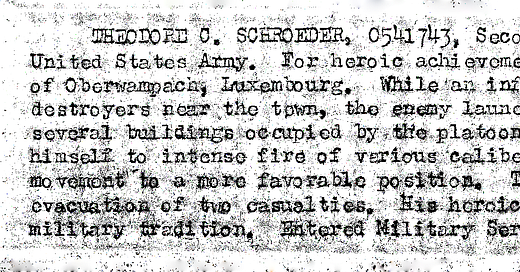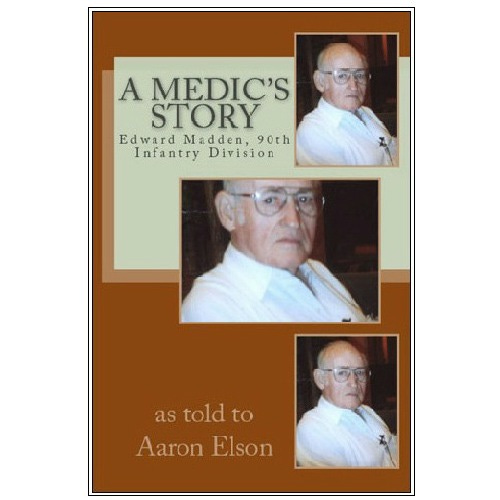A couple of weeks ago I got an email from Ted Schroeder about his grandfather, also named Theodore Schroeder, who was awarded a Bronze Star for his role in the battle of Oberwampach, Luxembourg, during the Battle of the Bulge. Ted had read “A Medic’s Story,” which was based on my interview with Edward Madden.
My name is Ted Schroeder, and I recently came across your book about Ed Madden. My grandfather, also Theodore (Ted) Schroeder, was in Company C of the 358th [Infantry Regiment] with Ed Madden. My grandfather died in 2003, but I have many letters and documentation of correspondence that my grandfather had with several of the men he served with. My grandfather was a 2nd Lt in the company at that time, and was wounded January 17. He received a Bronze Star and purple heart that day for helping to evacuate his men after being wounded. I have the report of this attached. The correspondence I have with the men he served with at Oberwampach includes Tommy McGowan, Rudolf Tonsich, Arnold Brown, Jonah Umstead. My grandfather mentioned that he briefly saw Tommy McGowan at the aid station before going to the hospital. My question to you is do you have any information shared by Ed about my grandfather? I don’t believe my grandfather ever attended any reunions of the 90th, at least in his later years as he was the caretaker for my grandmother with dementia for at least a decade.
Thank you and thank you for writing the book with Ed. It is quite a gift for those of us in later generations who want to learn about what our grandfathers did. He didn’t like to talk about what he did in the War very much.
Unfortunately, although I extensively interviewed Arnold Brown, the company commander of Company C, he didn’t mention the names of the men in the company other than that of Hassel Whitfield, a sergeant he put in for a posthumous Distinguished Service Cross (Whitfield died trying to save a 5 year old boy who rushed out of a house during an artillery barrage, and both were killed). I sent Ted a copy of “9 Lives,” as it contains Arnold’s story which would at least give Ted a picture of some of the battles and patrols in which his grandfather may have been involved.
Ed Madden told me at the 1993 reunion of the 90th Infantry Division that he and several others were trying to get the Medal of Honor for Tommy McGowan, who was a sergeant in the company. This is Ed’s account:
I was an aid man with C Company of the 358th Infantry Regiment when we occupied the little town of Oberwampach, Luxembourg, on January 16, 1945, during the battle of the Bulge.
Being a medic, I just go where the guys who are going to be doing the fighting go, and we were sent up on the side of a hill so that we could overlook one of the main supply roads that the Germans were using to reinforce their advance troops that had gone onward past Bastogne.
While we were up there, the guys were directing artillery fire and we had a couple of tank destroyers to fire down onto these troops. The Germans apparently found out where we were, and while we were firing down at them, all of a sudden we started taking some fire from behind us.
We were in a house, and when we looked out the window we could see off in the distance coming at us were some German tanks, and their guns were down and firing directly at us. This got reported to the people that direct us, and they told us that we should get the hell out of there and get off the hill.
The fellow whose group I was with, Tommy McGowan – he was a staff sergeant – told us to go ahead and pull back and he would cover us until we got off the hill and then he’d come down. So we left and we got down the hill. A little bit later I saw one of the guys that had stayed up there with McGowan and I said, “Where’s Tommy?”
And he said, “He got hit pretty bad and he can’t get out of there.”
I told the captain, “Those tanks were a long ways off, where we could see them, and I’m going to go back up the hill and see if I can get McGowan before the Germans get all the way in.”
So I go back up the hill all by myself, and there are some houses up there. I get to a corner and I turn the corner, and there’s a German tank sitting right in front of me. And they have some SS troopers right there with them. So I’m standing there, my mouth open, and saying, oh God, how did I get into this?
A couple of the SS troopers stepped out from behind the tank and they motioned me to come, and all that’s going through my mind was that just a few days before the SS had killed a couple of guys carrying litters, carrying our wounded back, and I thought Jesus, I’m in trouble.
This one guy took me up the hill a little bit, and he took me into a cellar – when I say the cellar this was on a hill, so the cellar was still on the street. He took me into this room in the cellar and he started looking through my stuff. Then he happened to look over in the corner – it was a little bit dark over there – and he sees one of our guys had been shot and killed and he’s laying on the ground over there.
About this time artillery starts coming in, and this SS trooper, he walks over to where the guy’s laying and he looks around, and he happens to spot the guy’s rifle. He picks it up and he looks at it, and he looks at me, and he picks the damn thing up and he points the rifle at me and pulls the trigger, but it was on safety. And before he could figure anything else out, the artillery came in like crazy, and all of a sudden we could hear some noise outside, and some people running.
What it was was that the artillery had hit this tank and knocked it out, so these guys abandoned the tank and they came running back up and they hollered into the house for the guy who was with me, and he goes running out and leaves me there.
Now, that sounds pretty good but the thing was that they went back further up the hill, and every time I would go over to the door of the house figuring I’d get out of here, they’d fire at me at the corner of the building and keep me in the house. So I had to stay there all this time and the artillery is just going like crazy.
When it got dark, I thought, I’ve got to get out of here. So I stripped off my overcoat. My medical pouches, he already took those off of me, and I crawled on my belly out through the door and I got through the door and around the corner.
Then I had to go back down, there was all this snow around there, and I thought with our brown clothing it’s sure to stand out in the dark. I went back down and I had to climb over a fence and I thought, if anybody’s around here they’re going to get me when I climb over that fence but I got over it, and I got back down to our side.
The irony of this whole thing was that I never saw McGowan. I never knew what happened to him. In 1990 – this is 45 years later – I get a phone call in my office, and a guy asks me, did I know Tommy McGowan from the 358 and I said, “Yeah, I knew Tommy real well. He was a good close friend of mine, but I think he was killed in the Battle of the Bulge.”
And he said, “Like hell he was.” He said, “I’m Tommy McGowan.”
I live right outside of San Jose in California, and he lives in San Francisco, so I went up and visited him, and I found out a lot about what had happened to him. He told me that while we were still up on the hill, I remember being in this house with him and we’ve got guys wounded and Tommy’s helping carry them downstairs and he’s firing at the Germans who were around us, and he was very active in everything that was going on up there, but I found out that he was directing the artillery fire. Now the irony of this whole thing was that I went up there to save Tommy’s life to get him out of there because I was going to carry him on my shoulders, back down that hill. I went up to save his life, but with him directing that artillery fire and knocking that tank out, he saved my life.
We are working, myself and a few other people that I know are working to try to get Tommy the Congressional Medal of Honor for what he did up there, because when the Germans came in, he got pretty badly wounded, and they must have seen that he had a radio there or a telephone, or whatever it was that he was using to direct the artillery, and they fractured his skull with their rifles and they broke his legs and they pounded the living hell out of him, and it was immediately after this happened that some other of our guys pushed them off of where they were attacking us, and they had to pull back, and some of our troops went up there and they got McGowan. They got him down to the aid station, he was immediately evacuated and he was sent back to England. And he spent about a year and a half in the hospital.
He calls me now all the time, because Captain [Arnold] Brown put me in for a Bronze Star for going up there to get him, and I showed Tommy that, and he said, “You went up the hill to get me?”
And I said, “Sure, Tommy.” I said, “What the hell, we were good friends.”
And he said, “I know that, but you risked your life to save me?”
And I said, “Yeah, well, that’s the way it was.”
So he calls me all the time and he just can’t thank me for what I tried to do for him. And that’s it, I never met Tommy until that one day in 1990. Now I see him, I just attended a ceremony down in Los Angeles at which he was awarded a Silver Star.
Tommy’s quite a name down in the Los Angeles area. When the state of California came out and issued the Purple Heart license plate, he was issued one of the first ones in a ceremony by the state of California.






